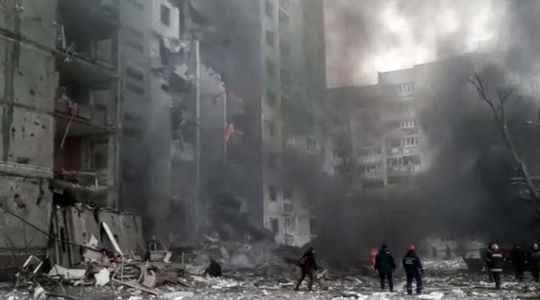A shower of bombs continues to fall on Ukrainian cities: Kiev and its suburbs, Chernihiv… On the night of Thursday March 3 to Friday March 4, the Zaporijia nuclear power plant, the largest in Europe, was hit by strikes from the Russian army. The offensive continues, residential areas, schools and hospitals are hit by bombs. Thursday, on the phone, Vladimir Putin repeated to Emmanuel Macron, for whom “the worst is yet to come”, his “great determination” to “take control” of all of Ukraine.
To bring down the local resistance, is the Russian president ready to climb the scale – already high – of brutality? This was denounced on Monday, February 28, Oksana Markarova, the Ukrainian ambassador to the United States, and Wednesday, March 2, Linda Thomas-Greenfield, the American ambassador to the UN. The first accused Russia of using a thermobaric bomb on a Ukrainian military base in Okhtyrka, not far from Kharkiv, in the east of the country, reports Politico. The second assured that Vladimir Putin’s army used weapons banned by the Geneva Convention, repeating the accusations of the NGOs Amnesty International and Human Rights Watch. What about?
A devastating double explosion
Russia, of course, has not confirmed the use of potentially devastating thermobaric bombs. And no independent verification has made it possible to formally certify it. In contrast, several observers on the ground, including a team of CNN reporters, spotted Russian convoys with multiple rocket launcher vehicles, numbered with the code name Thermobaric Weapon (TOS-1A). Jen Psaki, the White House spokeswoman, said she had “seen reports” of these weapons, but could not confirm their use. But “if it were true, it would potentially be a war crime,” he said.
The thermobaric bomb, or “vacuum bomb”, is a weapon of the conventional type. In 2007, after testing one of them, the Deputy Chief of the General Staff of the Russian Armed Forces described it as “the mother of all bombs”, “the most powerful in the world”, “comparable in effectiveness to a nuclear charge”. It acts in two stages. When the bomb comes close to its target, it explodes and releases a cloud of fuel which mixes with ambient oxygen. A second explosion, at high temperature, ignites the cloud. A depression is then created in the explosion zone, burning everything that is there. The shock wave is devastating for several hundred meters around the point of impact.
In urban areas, the use of this weapon would be particularly deadly. “The targets die of asphyxiation or burns”, sums up toParisian General Dominique Trinquand, former head of the military mission of the French delegation to the United Nations.
The International Criminal Court investigation
Early versions of such weapons are said to have been developed by Nazi Germany during World War II. The United States has used thermobaric bombs in Afghanistan and Vietnam; Russia in Afghanistan, Chechnya and Syria. Already, at the time, NGOs condemned their use. This is not prohibited by international law, but well framed by the Geneva Conventions (1949). Amnesty International recalls: “According to international humanitarian law, it is prohibited to use weapons which strike indiscriminately. Indiscriminate weapons are weapons which by their nature cannot target a military objective with precision because they are imprecise and their effects can be limited. Thus, when such weapons are used, it is almost inevitable that civilians will be injured or killed and that civilian buildings (schools, housing and hospitals) will be damaged or even destroyed.”
Amnesty International and Human Rights Watch have already documented and denounced the use by Russian forces of cluster bombs which have hit several civilian areas. This type of ammunition was banned after the adoption in 2008 of the Oslo Convention, signed by 119 States – but not Russia.
If the use of thermobaric bombs is proven, NGOs would have one more argument to make to the International Criminal Court (ICC). On Wednesday March 2, the ICC prosecutor announced the “immediate opening” of an investigation into the situation in Ukraine. There is a “reasonable basis” to believe that war crimes, within the jurisdiction of the Court, would be committed there.
